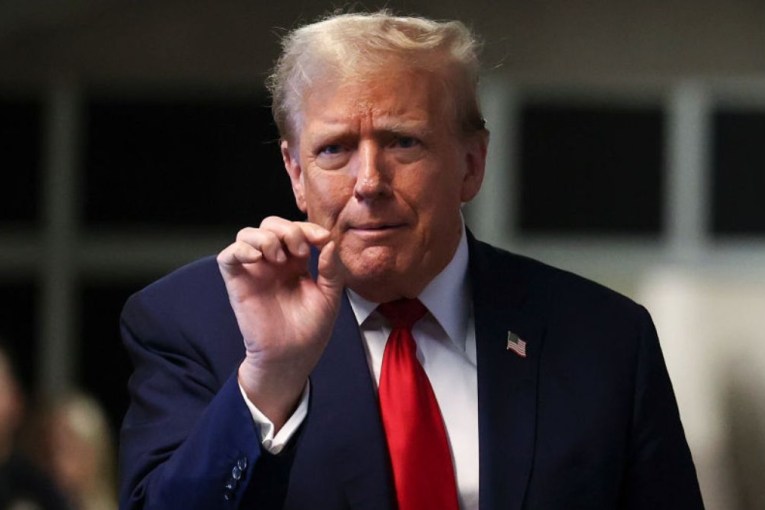Republican acquittal of Donald Trump is a pivotal moment for the party

Donald Trump and Melania at Joint Base Andrews in February this year before boarding Air Force One for the last time. Photo: The New York Times
During the first trial of Donald Trump, 13 months ago, the former president commanded near-total fealty from his party.
His conservative defenders were ardent and numerous, and Republican votes to convict him – for pressuring Ukraine to help him smear Joe Biden – were virtually nonexistent.
In his second trial, Mr Trump, no longer president, received less ferocious Republican support.
His apologists were sparser in number and seemed to lack enthusiasm.

Democrat Jamie Raskin, the lead manager for the impeachment. Photo: Getty
Far fewer conservatives defended the substance of his actions, instead dwelling on technical complaints while skirting the issue of his guilt on the charge of inciting the January 6 riot at the Capitol.
And this time, seven Republican senators voted with Democrats to convict Mr Trump – the most bipartisan rebuke ever delivered in an impeachment process.
Several others, including Mitch McConnell, the minority leader, intimated that Mr Trump might deserve to face criminal prosecution.

Republican Mitch McConnell. Photo: AAP
Senator McConnell, speaking from the Senate floor after the vote, denounced Mr Trump’s “unconscionable behaviour” and held him responsible for having given “inspiration to lawlessness and violence”.
Yet Senator McConnell had joined with the great majority of Republicans just minutes earlier to find Mr Trump not guilty, leaving the chamber well short of the two-thirds majority needed to convict the former president.
The vote stands as a pivotal moment for the party Mr Trump moulded into a cult of personality, one likely to leave a deep blemish in the historical record.
Now that Republicans have passed up an opportunity to banish him through impeachment, it is not clear when – or how – they might go about transforming their party into something other than a vessel for a semi-retired demagogue who was repudiated by a majority of voters.
Defeated by President Joe Biden, stripped of his social media megaphone, impeached again by the House of Representatives and accused of betraying his oath by a handful of Republican dissenters, Mr Trump nonetheless remains the dominant force in right-wing politics.
Even offline and off camera at his Palm Beach estate, and offering only a feeble impeachment defence through his legal team in Washington, the former president continues to command unmatched admiration from conservative voters.
Indeed, in a statement celebrating the Senate vote on Saturday (US time), Mr Trump declared that his political movement “has only just begun”.
Lanhee Chen, a Hoover Institution scholar and policy adviser to a number of prominent Republican officials, said the GOP would need to redefine itself as a governing party with ambitions beyond fealty to a single leader.
“When the conservative movement, when the Republican Party, have been successful, it’s been as a party of ideas,” Dr Chen said, lamenting that much of the party was still taking a Trump-first approach.
Many Republicans are more focused on talking about him than about what’s next. And that’s a very dangerous place to be.’’
In recent weeks, the party has been so submerged in internal conflict, and so captive to its fear of Mr Trump, that it has delivered only a halting and partial critique of Mr Biden’s signature initiatives, including his request that Congress spend $1.9 trillion to fight the coronavirus pandemic and revive the economy.
Mr Trump’s tenure as an agent of political chaos is almost certainly not over.
The former president and his advisers have already made it plain that they intend to use the 2022 mid-term elections as an opportunity to reward allies and mete out revenge to those who crossed Mr Trump.
And hanging over the party is the possibility of another run for the White House in three years.

Impeachment managers made the case that Mr Trump was responsible for the deadly January 6 attack. Photo: Getty
Only a few senior Republicans have gone so far as to say that it is time for Mr Trump to lose his lordly status in the party altogether.
Representative Liz Cheney of Wyoming, the highest-ranking House Republican to support impeachment, said in a recent television interview that Mr Trump “does not have a role as a leader of our party going forward”.
Several of the Republican senators who voted for conviction on Saturday thundered against Mr Trump after he was acquitted, in terms that echoed Ms Cheney’s explanation last month of her vote to impeach him.
“By what he did and did not do, President Trump violated his oath of office to preserve, protect and defend the Constitution of the United States,” said Senator Richard Burr of North Carolina, a senior lawmaker who is close to Senator McConnell.
But the line-up of Republicans who voted for conviction was, on its own, a statement on Mr Trump’s political grip on the party.
Only Senator Lisa Murkowski of Alaska is up for re-election next year, and she has survived gruelling attacks from the right before.
The remainder of the group included two lawmakers who are retiring – Senator Burr and Senator Pat Toomey of Pennsylvania – and three more who just won new terms in November and will not face voters again until the second half of the decade.
More typical of the Republican response was that of Senator Bill Hagerty of Tennessee, a Trump loyalist serving his first term.
The trial, he said on Saturday, was merely “a political performance” aimed at undermining a “successful” chief executive.
Still, Senator Kevin Cramer of North Dakota, a long-time Trump ally who has been critical of the former president since the November election, told reporters in the Capitol on Friday that he believed Mr Trump would be weakened by the impeachment trial, even if the Senate opted not to convict him. (Senator Cramer, who also called the trial “the stupidest week in the Senate,” voted for acquittal.)
“He’s made it pretty difficult to gain a lot of support,” Senator Cramer said of Mr Trump.
“Now, as you can tell, there’s some support that will never leave, but I think that is a shrinking population and probably shrinks a little bit after this week.”
An even more categorical prognosis came from Senator Murkowski.
“I just don’t see how Donald Trump will be re-elected to the presidency again,” Senator Murkowski said.
Even in places where Mr Trump retains a powerful following, there is a growing recognition that the party’s loss of the White House and the Senate in 2020, and the House two years before that, did not come about by accident.
In Georgia – the site of some of the party’s most stinging defeats of the 2020 campaign – Jason Shepherd, a candidate for state party chair, said he saw Republicans as grappling with the kind of identity crisis that comes periodically with “a loss after you’ve had a big personality leading the party,” likening Mr Trump’s place in the party to that of Ronald Reagan.
Republicans, Mr Shepherd said, had to find a way to appeal to the voters Mr Trump brought into their coalition while communicating a message that the party is “bigger than Donald Trump”.
But he acknowledged that the next wave of candidates was already looking to the former president as a model.
“Republicans are trying to position themselves as the next Donald Trump,” he said.
“Maybe, in terms of personality, a kinder and gentler Donald Trump, but someone who will stand up to the left and fight for conservative principles that do unite Republicans.”







